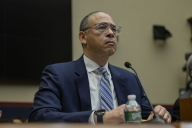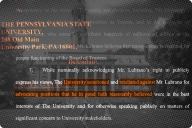You have /5 articles left.
Sign up for a free account or log in.

Marvin Krislov
Pace University
Marvin Krislov is in for a dramatic change of scenery.
Krislov, the 56-year-old president of Oberlin College, was announced on Tuesday as the next president of Pace University, effective Aug. 1. The move will have him leaving a 3,000-student liberal arts college and conservatory in northern Ohio that’s known for sharply leaning to the left in order to lead a professionally oriented 13,000-student university with campuses in Manhattan and New York’s Westchester County.
The differences don’t stop there. Oberlin’s student body is decidedly whiter, richer and more traditional than Pace’s. While Oberlin reports that 20 percent of its student body consists of students of color, Pace says its undergraduates are 49 percent white. At Oberlin, 9 percent of first-time undergraduates received Pell Grants in 2014-15, indicating they came from low-income families. The portion of first-time undergraduates receiving Pell Grants at Pace that year was 34 percent, according to federal data. Pace also has more than 3,500 graduate students and more than 500 law students.
It’s not the typical next step for a college president in Krislov’s position. He announced in September that he would be stepping down at the end of this academic year after a decade as Oberlin’s president. But one might expect his career arc to bend more toward another liberal arts college or a widely known research institution next. He was a finalist for the president’s position at the University of Iowa in 2015.
Instead, Krislov sees Pace as an opportunity to grow personally. He hears tremendous concern right now over whether higher education is providing students with enough opportunity, he said in a telephone interview Tuesday. Krislov sees Pace as a place that has traditionally helped first-generation students, students from working-class families and immigrants.
“I think higher ed is changing,” he said. “I think Pace may be the model for the kind of college or university we’re going to need more of. I’m excited about building a different model and taking this opportunity.”
Krislov sees himself as a longtime advocate of opportunity for those who are disadvantaged and for civil rights. At Oberlin, he created an access initiative that eliminated loan requirements for Pell-eligible students. Before that, he was among the leaders of the University of Michigan’s successful legal defense of affirmative action in front of the U.S. Supreme Court when he was that university’s vice president and general counsel.
Pace’s institutional values fit with Krislov’s, he said. He also pointed out that Pace has a liberal arts core, arguing that there are similarities with Oberlin.
Yet Krislov returned to the fact that he is interested in working with different types of students at his next stop.
“There are students who are working, and then there are also non-traditional-aged students,” he said. “That’s a population that I’ve had less experience with at Oberlin, I’ve had some experience with at Michigan. But that’s something I’ve been thinking more about, is the role of higher education in providing opportunities for older students.”
At Oberlin, Krislov was noted for his fund-raising successes, defense of the liberal arts and success with construction and renovation projects. He shot past a $250 million goal in a comprehensive campaign, eventually raising $318 million. He built a new jazz studies building, natural gas power plant and stadium complex.
But he also came under scrutiny amid several recent controversies at Oberlin. His handling of a situation in which an assistant professor made anti-Semitic statements on her Facebook page was scrutinized. He decided not to directly respond to demands from some black students, arguing that those demands were not consistent with the ideas of collaborative engagement and shared governance. He was also in charge when Oberlin offered employee buyouts last year in an attempt to save millions of dollars.
He will have the chance to put his reputation as a fund-raiser and a builder to the test at Pace. The university is starting a $190 million plan to expand and renovate its Manhattan campus. Pace recently performed millions of dollars’ wroth of renovations on its Westchester County grounds.
Pace faculty members seemed pleased with Krislov’s hiring. Nancy Reagin is a professor of history and women’s and gender studies who chairs the Pace New York Faculty Council. She was also on the presidential search committee.
Reagin commended Krislov’s commitment to diversity and fund-raising credentials. Krislov was the search committee’s unanimous first choice, she said. But search committee members were aware that Pace wasn’t a traditional next step for a president in Krislov’s position.
“We were very excited about his application, but he also had to persuade us he was interested,” Reagin said. “He wanted a change, and we’re certainly a change. I think a lot of the things going on here are attractive.”
Faculty members in Westchester are supportive as well. Padma Kadiyala is a professor of finance who is the former chair of the Faculty Council in Westchester.
“His past and most recent experience at Oberlin College, I think that would serve him very well,” Kadiyala said. “We do have a very strong liberal arts program.”
Krislov will take over at Pace from Stephen J. Friedman, 78, who is stepping down after 10 years as president.








